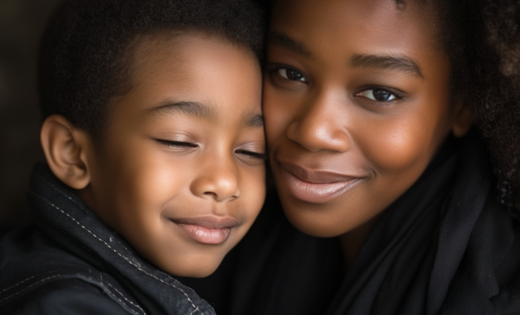on
BY SIMONE J. SMITH
“It’s the maddest pride.”
These are the words of the newest R&B/pop sensation who most recently released his new EP “For When It’s Over.” This young man has been keeping busy, gracing stages and creating considerable industry buzz at: SXSW, NYC, and at School Night (LA). The six song EP follows the release of his up-tempo single “Rogue” where this musical genius paints a picture of the irresistible allure of forbidden love. The video for “Rogue” captures the feeling and vibe of blasting music in your car on a late-night drive through the city…. Hmmmm!
On Wednesday April 3rd, 2024, the Toronto Caribbean Newspaper was invited out to the album release event being held to introduce this homegrown star to the world. As this young man stepped into the spotlight, his presence commanded attention. He took a deep breath, and as he began to sing, the room fell silent. The first notes of his voice ring out, pure and resonant. There’s a quality to his voice that’s undeniable; it drew everyone in, making them forget the world outside. His voice carried emotion, weaving through the Drake Hotel Underground like a gentle breeze, touching the hearts of everyone in the room. It was as if he poured his soul into every word, every melody.
With each passing moment, the intensity of his performance grew, building to a crescendo that sent shivers down my spine. There was a raw power in his voice that was impossible to ignore.
His name is Vincent Darby and he’s a R&B-pop singer from Birmingham (UK). He destroyed SXSW, and New York’s The Rockwood. He just lit up School Night in LA the night before the release party. Of course, I had to go and see what the buzz was all about.
While “Rogue” embodies Vincent’s commitment to pushing the boundaries of R&B and Pop, it also serves as the lead track off his new EP. “I started the process back in 2016 and I called the EP “For When It’s Over” to document what love/lust feels like within this generation of quick attention spans and dating apps,” shared Vincent. “In a world of instant gratification, genuine fulfillment in love doesn’t really exist.”
The EP encapsulates these sentiments in under 20 minutes, reflecting on intense yet short-lived relationships, now normalized in our society. Vincent is the genesis of musical innovation in the Pop and R&B genres, drawing from his soulful upbringing to craft unforgettable melodies that captivate audiences worldwide.
“For When It’s Over’ is being released by 7 Long Lane Entertainment, an independent label dedicated to nurturing emerging talent in the music industry. From talent development to marketing, the label guides artists on their journey to success. With strong industry connections and a commitment to excellence, the team has contributed to the success of artists including Billie Eilish, Eminem, Mariah Carey, and many more, ensuring long-lasting careers for their roster. It does go to show the importance of having a solid team around you; it allows an artist to focus on what they do best; create.
Inspired by his British upbringing and Jamaican heritage and introduced to music at a young age by his radio DJ grandfather, Vincent’s journey has taken him from karaoke bars showcasing his electrifying voice; to a sold-out headline performance at The Jazz Cafe in London, and a coveted spot at BBC Radio 1’s big weekend festival. With hits like “We Could Be” resonating globally and earning acclaim from MTV and BET, this young star is on a fast track to solidify his position as a trailblazer.
Born and raised in Birmingham England on the edge of the countryside near the city is where Vincent started his musical journey. When I sat down with Vincent, his energy was palpable; he was so willing to share his journey.
“My grandparents moved from Jamaica a few years after the windrush,” he began. “They kept their culture and ensured that generations after them had Caribbean culture embedded in them. My mom was born in England but was raised in Jamaica. Her parents sent her back to Jamaica when she was younger, and you know what that means. Raised in Jamaican culture, navigating as a young woman brings unique experiences, and those strong values are instilled in me.”
“I used to sing all the time when I was a kid. My mom would say that even when I was crying, it would seem like singing. This continued, and when I was five, we were on a family trip. I started singing Karaoke, and my mom was like, okay! This is what he wants to do. She recognized my talent and wholeheartedly embraced, nurtured it, and I blossomed.”
Naturally, other people saw Vincent’s talent, and wanted to capitalize on it. For some reason, even at a young age, Vincent followed his instincts. “I realized early that I didn’t want to do it yet. I wanted to be a kid, and my mom was like, ‘I am glad you feel like that, because you are not doing anything until you finish school.’ I really took it there at 16 years old and did my first recording in Jamaica. What an experience that was.”
“I have a special love for the city of Toronto; it was the first place that I travelled by myself. I was about 17 years old at the time, and you can imagine the excitement. I was travelling, doing what I loved, and my family supported me. Incredible feeling.”
I asked Vincent to share how it felt in front of a crowd that absolutely loved him. “It went so well for me on Wednesday, that I was sad that it was over. I looked out into the audience; I saw my family. I am so focused usually, but then this feeling came over me when I saw them. It was such a different feeling. So glad to have them.”
As the final notes faded away, the room erupted into thunderous applause, and demanded an encore. The young man stood on stage, a smile on his face, knowing that he had just witnessed the birth of his career.
Stay in the loop with exclusive news, stories, and insights—delivered straight to your inbox. No fluff, just real content that matters. Sign up today!
We, as humans are guaranteed certain things in life: stressors, taxes, bills and death are the first thoughts that pop to mind. It is not uncommon that many people find a hard time dealing with these daily life stressors, and at times will find themselves losing control over their lives. Simone Jennifer Smith’s great passion is using the gifts that have been given to her, to help educate her clients on how to live meaningful lives. The Hear to Help Team consists of powerfully motivated individuals, who like Simone, see that there is a need in this world; a need for real connection. As the founder and Director of Hear 2 Help, Simone leads a team that goes out into the community day to day, servicing families with their educational, legal and mental health needs.Her dedication shows in her Toronto Caribbean newspaper articles, and in her role as a host on the TCN TV Network.













